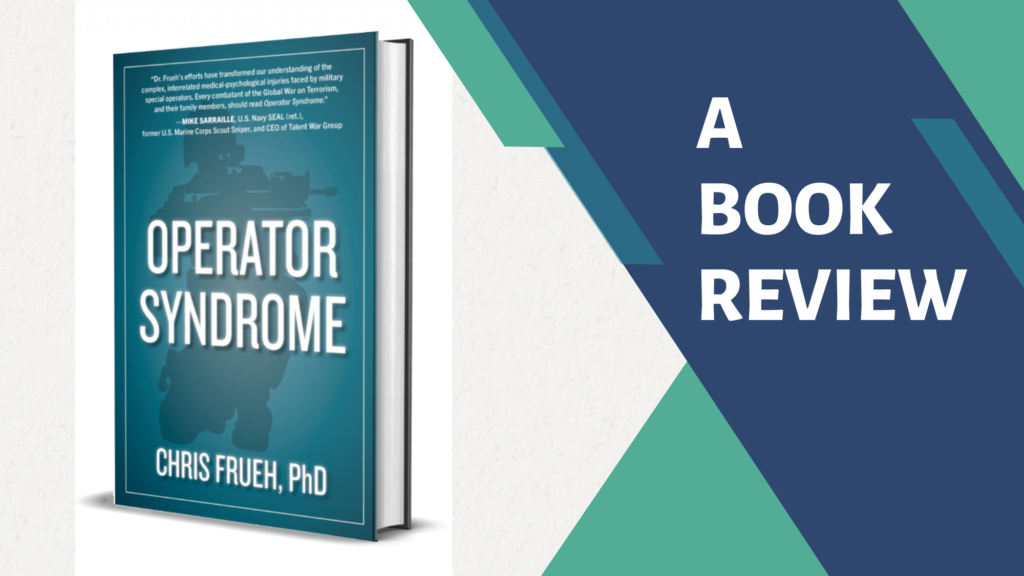
Operator Syndrome – A book review
A therapist’s review of Operator Syndrome by Chris Frueh
Review by Maddie Vann, LPC, CSAC
Special Operations Forces (SOF) service members and veterans often experience a range of challenging symptoms, but they have struggled to find clear guidance on how to improve their well-being. Instead of feeling heard and finding care, they might be written off as psychosomatic. Meanwhile, families endure their SOF service member’s suffering marked by irritability, pain, memory concerns, unclear thinking, a short temper, alcohol or substance use, post-traumatic stress, sadness, anxiety, disturbed sleep, and guilt/shame/existential questions related to life and their service.
What is Operator Syndrome?
“Operator syndrome” (link) is a phrase used to organize and describe the seemingly unrelated collection of symptoms and causes rooted in the unique professional experiences of SOF service members. Operator Syndrome is not a formal diagnosis. However, it accounts for a number of different factors (including some formal diagnoses) that could be negatively impacting SOF members.
A Therapist’s View
Personally and professionally, I couldn’t wait to get my hands on the new book Operator Syndrome (link) by Chris Frueh, PhD. I am a licensed professional counselor and certified substance abuse counselor, and the majority of my clients are military service members, veterans, first responders, and their families. For a while, I’ve been helping clients understand the overlapping symptoms of trauma, grief, substance use, and traumatic brain injury (TBI), which is only a portion of the challenges discussed in Operator Syndrome. I am also the wife of a retired NSW member. Both personally and professionally, I’ve known many individuals who likely have experienced operator syndrome – or who have loved someone going through it. I’ve also seen the confusion and uncertainty that comes from not knowing how all these symptoms link together.
Impact Beyond SOF
Frueh acknowledges there are other professionals, such as firefighters, who experience a similar constellation of risk factors: work shifts that interfere with sleep, intense physical demands, regular exposure to danger and death, working in extreme situations, possible exposure to chemicals or toxins, high risk of TBIs and other injuries, work cultures that include alcohol use, and high values around protecting teammates and the public at the expense of one’s self.
What the Book Covers
The book is an informative, easy-to-read resource that includes a 17-item Operator Syndrome Scale for a brief self-assessment, as well as detailed, concrete action steps special operators can take to reduce overall inflammation, improve mental health, and better advocate for their physical health. Frueh doesn’t shy away from difficult topics and makes recommendations that, in my experience, the SOF community doesn’t always want to hear. These include:
- Struggling with depression or anxiety? Get therapy.
- Coping with PTS symptoms? Evidence-based trauma therapies reduce distress significantly.
- Drinking too much alcohol in order to avoid pain, depression, memories, lack of sleep, etc? Get yourself into a medical detox program and addiction treatment.
- Trying to complete the old SOF workout despite physical pain? Maybe it’s time to switch it up to yoga and resistance bands.
- Suffering from the signs of a TBI? Seek out a brain and/or vestibular rehabilitation* program.
- Feeling fatigued and irritable for no reason? Maybe it’s a treatable hormonal imbalance.
- Unable to be emotionally and sexually intimate the way you want to be? Talk to a couples and/or sex therapist to find creative solutions.
Frueh also makes some unexpected but welcome recommendations displaying an openness and curiosity to the growing body of research. These include:
- Supporting psychedelic/plant medicine therapies,
- Carefully consider possible blast exposures for brain impact, and
- Also ask for testing for parasites and chemical exposures related to the places to which an individual deployed.
In Summary
As a therapist, I am very appreciative of this book because I know I will be recommending it widely and hoping that it helps people we all care about take a strategic approach to achieve greater well-being. I also believe this book is a must-read for anyone who has a current or former special operator in their lives, to better understand the demands and possible impacts of the commitments made by these elite individuals. The book can serve as a jumping-off point for deeper conversations about how to orient towards the engaged and abundant lives clients desire.
I have also learned through my professional networks that there is a related book, Warrior Syndrome (link), the most recent edition published in 2023, by Thomas Johnson, MD, which is also worth reading as the military community as a whole grapples with the challenges identified in both books. Dr. Johnson is an internal medicine physician located at Camp Lejeune.
About the Author
Maddie Vann, LPC, CSAC, is a therapist in private practice in Williamsburg, VA, and at The Farley Cente. Her primary focus on helping mil/vet/first responder and adults in midlife manage trauma, grief, and addiction concerns.

